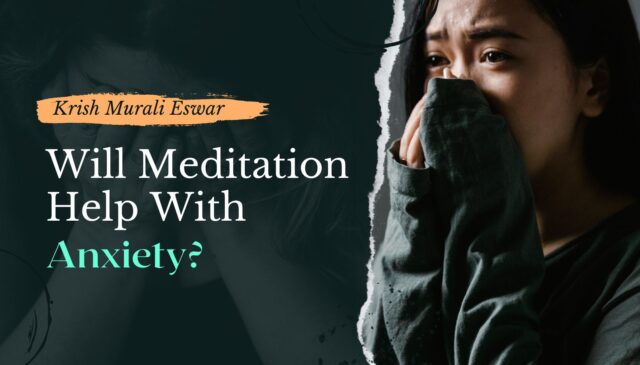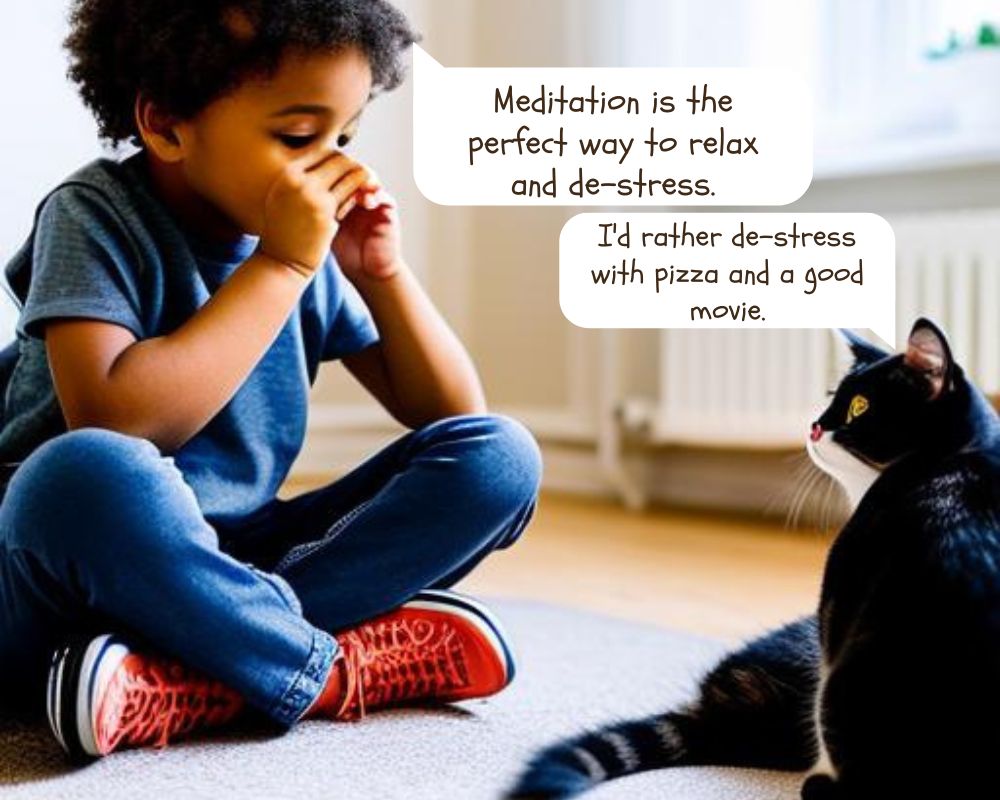
Yes, a study conducted in 2013 found that meditation reduced anxiety symptoms.
Introduction
Meditation is an ancient practice that involves:
- calming the mind,
- focusing on your life force, and
- letting go of distracting thoughts.
It has been used for centuries to:
- reduce stress,
- increase well-being, and
- improve mental clarity.
Meditation has recently been studied as a potential treatment for anxiety. It has been found to help reduce symptoms such as worry, fear, and restlessness.
What is Meditation?
As a meditation teacher, I want to tell you about a powerful ancient practice. It can help you solve anxiety by awakening kundalini and focusing on life-force pulsations. Kundalini is the divine energy that lies dormant at the base of your spine. When released, it flows up your spine, unlocking the body’s seven chakras, or energy centers.
When you focus on the pulsations of kundalini, your body and mind relax into a state of inner stillness and peace. You can feel the life-force energy circulating your body, allowing the worries and anxieties of life to drift away slowly. This type of meditation is potent. It can help you to transform your life and create a sense of inner calm and balance.
How Does Meditation Help with Anxiety?
- Meditation helps to reduce the intensity of anxious thoughts by allowing one to observe them without judgment. In this way, meditation can help to reduce the physical and mental strain of anxious thinking.
- Meditation can help cultivate an acceptance and understanding attitude towards anxious thoughts and feelings. This can reduce the power of these anxious thoughts and feelings, making it easier to remain calm in the face of them.
- Meditation can provide a space to explore the underlying causes of anxiety. By tuning in to one’s inner experience, one can identify the thoughts, feelings, and beliefs contributing to one’s anxious state.
- Meditation can help to build emotional resilience by teaching one to sit with difficult emotions without becoming overwhelmed. This can help reduce anxiety’s intensity and provide a space to process it constructively.
- Meditation can help build self-compassion and self-awareness, which can be invaluable when dealing with anxiety. Through meditation, one can learn to be kinder to oneself and to recognize the signs of anxiety before it becomes overwhelming.
- Meditation can help to cultivate a sense of presence and gratitude. This can help break the anxious thought cycle and provide a space to appreciate the present moment.
- Meditation can help to reduce stress levels, which can have a positive impact on overall well-being. This can, in turn, reduce the frequency and intensity of anxious thoughts.
- Meditation can help to refocus the mind on the here and now, which can be a powerful tool in helping to manage anxiety. By bringing one’s attention to the present moment, it is possible to break the cycle of anxious thinking and remain in the present.
- Meditation can help to cultivate a sense of perspective and clarity. This can help reduce the power of anxious thinking and provide a more balanced outlook.
- Meditation can help to cultivate a sense of inner peace and contentment. This can help to reduce the intensity of anxious thoughts and provide a sense of calm in the face of them.
Guided Meditation Script for Reducing Anxiety
Welcome to this guided meditation for reducing anxiety. It is essential to find a comfortable position, allowing your body to be relaxed and still. You can sit in a chair or down, whatever is most comfortable for you.
Take a few moments to close your eyes and focus on your breath. Allow your breath to become slow and steady, with each breath feeling deeper and more relaxed than the one before.
Step 1:
With each exhale, imagine you are releasing any tension or stress you may be feeling. Feel the tightness in your muscles slowly fading away.
Step 2:
Now, focus on your body and notice the sensations that you are feeling. Start at your toes and work your way up your body, noticing any sensations in your feet, legs, torso, arms, hands, neck, and head.
Step 3:
Once you have done this, imagine a warm, soothing light enveloping your body. This light is calming and peaceful. Let your body relax into this warmth and allow it to take away any anxiety or stress that you may be feeling.
Step 4:
Now, take a few moments to focus on positive thoughts and feelings. Think of something that you are grateful for in your life. It can be something small or something big. Allow yourself to feel gratitude and appreciate all the good things you have in your life.
Step 5:
Now, visualize a happy and peaceful place. It can be anywhere that makes you feel safe and relaxed. Imagine the sights, smells, and sounds of this place. Allow yourself to be immersed in the peacefulness of this place and feel your anxiety and stress slowly melting away.
Step 6:
Take a few moments to focus on your breath again. Imagine each breath slowly flowing in and out of your body, calming and soothing you with each inhale and exhale.
Step 7:
Finally, when you are ready, take one last deep breath and slowly open your eyes. You can take this calm and peace with you throughout the day.
Conclusion:
Thank you for taking the time to participate in this guided meditation for reducing anxiety.
A Powerful Introspection Technique to Overcome Anxiety
One of the most potent introspection techniques to overcome anxiety is to practice mindful self-reflection.
Mindful self-reflection involves pausing and observing your thoughts, emotions, and physical sensations in the present moment without judgment or attachment to them. This allows you to gain insight into what is causing your anxiety and can help you come to terms with it more constructively.
It encourages you to take responsibility for your own emotions and reactions and to gain a better understanding of your own needs and boundaries.
Mindful self-reflection can help you to develop self-compassion and acceptance, allowing you to move forward with greater clarity and ease.
Silent introspection is taught in our Vethathiri SKY Yoga courses.
Conclusion
If you’re looking for a solution to your anxiety, why not give awakening kundalini and focusing on life-force pulsations a try? Take some time out of your day to sit in stillness and let the power of ancient wisdom open your heart and mind to a new level of inner peace and harmony.
Kundalini Meditation helps reduce anxiety,
It is a powerful way to ease the heart and mind.
It works in mysterious ways, helping us unwind;
It allows us to be free, to leave the stress behind.
The life force is the key, when it comes to Kundalini,
Focusing on the pulsation in Sahasrara chakra.
It helps us to be mindful, helps us to be still,
Gently guiding us to a place of peace and will.
The energy of the body, from the crown to the root,
Helps us to find balance, and to heal our wounds.
It helps us to take charge, to be in control,
So that we can move forward, and make our goals.
Kundalini Meditation helps to clear the mind,
It helps to break through the blocks that keep us confined.
It has the power to restore and to heal,
And bring us to a place of deep peace and real.

Don’t let yourself get stressed out. Subscribe to my newsletter and comment on the blog. I am here to help you.
Be Blessed by the Divine!
Krish Murali Eswar.
I am Selvakumarinarayanan living in Indira nagar, Bengaluru
I completed my introspection 3rd, before 10 yrs in Chennai, now I don’t know how to be peaceful and mindful.i want to continue my spiritual path.
Four practices will help us be at peace:
1) Swamiji’s simplified exercises
2) Kayakalpa Yoga
3) Simplified Kundalini Meditation
4) Introspection in Silence
Be Blessed,
Krish Murali Eswar.